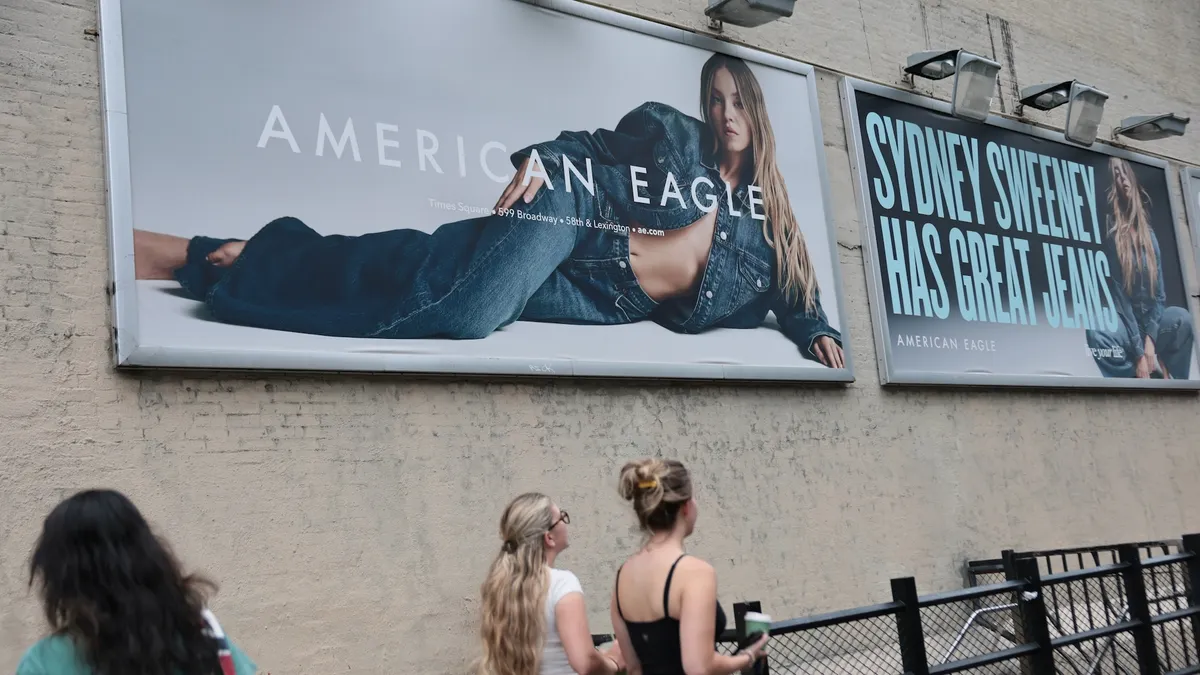Not everyone was a fan of American Eagle’s back-to-school campaign starring Sydney Sweeney, with some critics going as far as to claim the ads promoted the long-disproven theory of eugenics in drawing a connection between the “Euphoria” actor’s “great” genes and choice of denim. Discussing the effort on a Q2 earnings call Wednesday, Chief Marketing Officer Craig Brommers didn't sweat the backlash.
“The new American Eagle history has just begun,” said Brommers.
The celebrity-led marketing strategy has been a boon for business in an otherwise challenging retail environment beset by tariffs, executives emphasized. As marketers try to navigate appealing to consumers in politically fractured times, the Gen Z-focused apparel maker is demonstrating that staying the course despite intense blowback can pay off.
Two recent American Eagle campaigns centered on A-listers — the one featuring Sweeney, which launched in July, and a separate capsule collaboration with NFL star Travis Kelce’s Tru Kolors brand that landed ahead of Labor Day weekend — generated around 40 billion impressions, executives said. That level of attention, described as “staggering,” could be attributed to the national firestorm that enveloped the Sweeney push (even President Donald Trump chimed in). More importantly for American Eagle, these marketing ploys have generated “unprecedented” new customer acquisition, with customer counts up 700,000 over the summer period.
“The American Eagle Sydney Sweeney campaign was intended to be a brand and business reset, and it has,” said Brommers. “To be clear, that consumer acquisition is coming from every single county in the U.S. This momentum is national, and it is pervasive.”
Reaching an ‘inflection point’
Both the Sweeney and Kelce partnerships center on limited-time apparel that has flown off shelves, such as Sweeney’s sold-out wide-leg jeans with butterfly details. The work with Kelce debuting right ahead of a long holiday weekend also led to American Eagle’s best Labor Day sales to date.
That’s not to say the high-wattage partnerships have immediately turned around the business. Net revenue at parent American Eagle Outfitters, which also owns Aerie, was down 1% year over year to $1.28 billion in the Q2 period ended Aug. 2. Comparable sales declined 3% for the flagship American Eagle brand. But executives emphasized that the strong response to its celebrity collaborations provides momentum heading into the thick of Q3 and the critical holiday period.
“Second quarter comps declined yet demand improved throughout the quarter, and I am confident that we are at an inflection point,” said Jennifer Foyle, president and executive creative director, on the earnings call.
American Eagle will continue to expand the Sweeney campaign through the end of the year while a second drop with Kelce’s Tru Kolors is slotted for Sept. 24, as football season shifts into high gear. The challenge for the brand is converting a lightning-in-a-bottle marketing moment into long-term growth and maintaining its new fans amid mounting macroeconomic uncertainty. At least for marketing executives, the tone remains optimistic.
“We know that purchase intent is significantly and meaningfully up, and we’ll be looking to convert this buzz into business all through the back half of the year,” said Brommers.

















